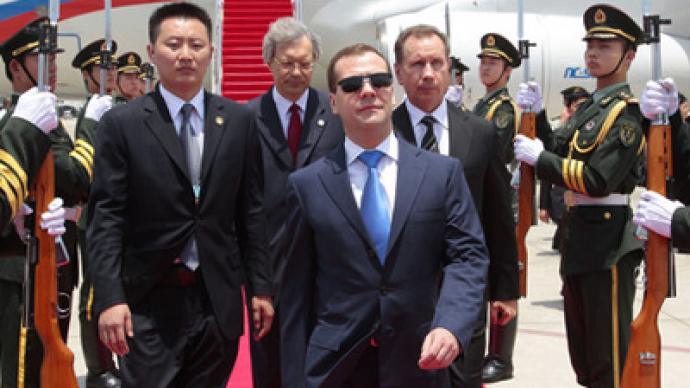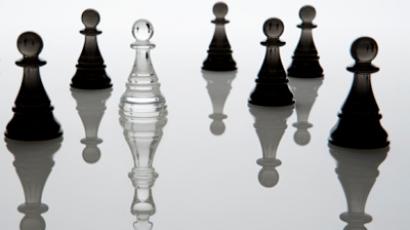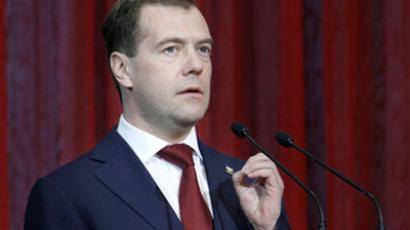Medvedev's re-election comments rattle Russia’s political markets

Adhering to his mantra of change, Russian President Dmitry Medvedev said he will announce soon whether to seek re-election in March 2012, thus sparking a pundit firestorm.
In an interview with China's CCTV on the sidelines of a summit of the BRIC market nations, Medvedev discussed the political climate in his country, saying it was important to “create new forms of direct democracy.”“My strategy is to modernize Russia’s economy and its political life,” Medvedev said, stressing that the process should not be undertaken in haphazard fashion. “We should not reject everything good, everything we have done, say, in the past two decades, and in the last decade in particular, but we should look ahead.”“Is our political system ideal,” Medvedev asked rhetorically. “No, it is not. It is developing. We have the Constitution that generally reflects our current social structure. But, at the same time, we should modify our legislation, if necessary. We should create new forms of direct democracy in our country.”Medvedev then forwarded a slightly different tact than his presidential predecessor, Prime Minister Vladimir Putin, whose administration advanced Russia’s own unique brand of government known as “sovereign democracy.” Vladislav Surkov, First Deputy Chief of Staff of the President of the Russian Federation, in a speech in February 2006, to the United Russia party, defined sovereign democracy as “a society's political life where the political powers, their authorities and decisions are decided and controlled by a diverse Russian nation for the purpose of reaching material welfare, freedom and fairness by all citizens, social groups and nationalities, by the people that formed it.”“We should be open to criticism,” Medvedev stressed. “It doesn't mean that we should take up every recipe we are being offered, but we should nevertheless listen to them attentively and only after that draw our conclusions as to what is acceptable to us and what is not.”We shouldn't shut ourselves off and say: "You see, we know everything ourselves, we will sort it out ourselves.” Because, as a rule, what goes afterwards, is conservatism, unwillingness to change and, after that, stagnation and erosion of the state’s foundations,” he continued.Medvedev then said that Russia must be “ready for changes” in all realms of national life.“Unfortunately, our country went through all that [unwillingness to change],” he acknowledged. “It happened in the late 1980s – early 1990s when our former country ceased to exist. That is why we should be ready for changes, we should change, we should modernize our economy, social life and political system. New people, new politicians, new business managers should come…”The Chinese interviewer then asked President Medvedev to comment on his level of cooperation with Prime Minister Vladimir Putin, as well as the prospects of him seeking a second term in office.“Regarding my relations with Mr Putin,” Medvedev began, “I have already spoken about that on several occasions and would like to say it again. We have friendly and very warm relations that have been shaping over the last two decades.”Dmitry Medvedev, a native of St Petersburg like Putin, said that he and the prime minister “hold different positions.”“We communicate, and communicate, naturally, in a friendly manner, but today we hold different positions, perform different roles: I am president of the country, I guarantee compliance with our Constitution; I am head of state,” Medvedev said. “The president forms the government and manages many of the processes in the country. The government does its own work: it is responsible for the economy, social sphere, it works on a daily basis, which is also hard.”The Russian leader, without getting into the details, said that all of the circumstances have “affected my relations with my colleague, and it could not be otherwise.”Medvedev added that the situation was the same when he worked in the government and Mr. Putin was the president.“It is only natural.”Concerning the possibility of running for a second term of office, Medvedev called it his “duty” to consider it.“As for the future, well, nobody can tell the future, but I can tell you that as the current head of state, as president, I am thinking about it, it is my duty,” he said. “I do not rule out the possibility of my running for a second term in the presidential elections. The decision will be taken very shortly since, as you have correctly pointed out, the elections are less than a year away.”The Russian president stressed that such a decision should take into account “the existing social situation, current political environment and, most importantly, the attitude of people.”Medvedev added that it was important to “avoid acting mechanically,” instead, making sure that one has “a clear understanding of the situation.”The Chinese journalist then asked President Medvedev to comment on his stated goal, which was also mentioned by Putin, of transforming Russia into one of the strongest and most powerful states in the world in a decade or two.“I think that there is no sound political force in Russia that does not want prosperity for the country, our beloved country, the Russian Federation,” Medvedev said. “It may be that we just have different views on the methods and ways to achieve this prosperity. But this is what democracy is all about. This is what competition is all about. I have my own opinion, but someone else might have a slightly different one.”The Russian leader added that “the priorities for development should be very close, and only in this case success is possible.”To run or not to run…The question that many political pundits are now asking is who will get the support of United Russia, the majority party."Dmitry Medvedev's statement to Chinese media is one more of his presidential bids, a bid for a new presidential term, which has been compatible with the general logic of his conduct of late," Aleksey Makarkin, the first vice president of the Center of Political Technologies, told Interfax on Tuesday."Medvedev is demonstrating quite actively that he would like to run for the second presidential term," he said."But it is clear that a final decision will be made by the two people, and it looks like the moment for making a decision is near,” Makarkin noted. “I don't think they will go against one another, I am sure they will reach an agreement.”Another political analyst, Gleb Pavlovsky, said in commenting on Medvedev's statement to Chinese media that "Medvedev is prepared for this step [making decision on running], but I am sure there will be a conversation with the premier anyway, because a political formula with which a candidate will run for president will be important.”Meanwhile, The United Russia party has said it will support its leader Vladimir Putin in the 2012 presidential elections if he decides to run. If not, it is prepared to back the incumbent leader Dmitry Medvedev, said Oleg Morozov, a member of United Russia's Supreme Council bureau and a first deputy chairman of the State Duma."We have said repeatedly that Vladimir Putin is our leader, and if he runs for president, we will certainly support him in the elections,” Morozov said on Tuesday.“This is United Russia's principled position, and it is absolutely natural and logical.”Robert Bridge, RT














